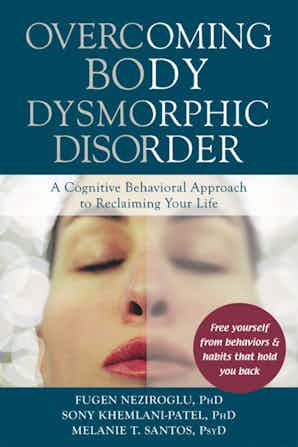Step 1: Conduct an Assessment and Provide Education
The first step of the CBT treatment for body dysmorphic disorder is to conduct an assessment of the person’s symptoms in order to verify that he or she is struggling with BDD and not some other similar problem. This is often done with tools such as the BDD Questionnaire, the BDD Examination Self Report, the Body Areas Satisfaction Test, and a detailed history of the person’s behaviors. These BDD assessment tools can also help the person record his or her progress as the treatment proceeds.
Once a person has been diagnosed with BDD, he or she should learn about the basic nature and causes of the disorder (as highlighted above). It’s also important to educate the person’s family and friends about the disorder in order to help them understand how they might be playing a role in maintaining the disorder, as well as how they might be able to help during the treatment. It’s also important for everyone involved to understand that CBT is an active form of treatment that requires the person with BDD and his or her loved ones to do work outside of the therapy session.
Step 2: Develop Relaxation Skills
The second step of the treatment for BDD is to learn relaxation skills. People with BDD often experience physical tension in addition to their mental stress. Learning relaxation skills can help relieve both problems, and there are a variety of different techniques that a person can learn. Included here are a few of the most important. All of these techniques include focusing on slow, rhythmic abdominal breathing, which often produces a feeling of calmness. This type of breathing is often incorporated into some kind of mindfulness meditation practice, in which a person focuses on allowing his or her thoughts to arise and disappear.
Physical relaxation skills are also important, such as progressive muscle relaxation. This involves a seven-second tightening and releasing of specific muscle groups from head to toe, with emphasis on noticing the difference between the tense feeling and the relaxed feeling.
Next, a person might learn how to release muscle tension without first tensing the muscles. This is done by focusing attention on the muscles and visualizing the tension being released.
Next, cue-controlled relaxation is often helpful, in which a person is taught to relax his or her body by saying a relaxing word, such as “peace” or “relax,” with each slow exhalation.
And, finally, special-place visualization is often taught. This skill teaches the person to envision a place of safety and comfort in his or her imagination. The person can go to this “mental safe place” during the BDD treatment if he or she is overwhelmed by distressing feelings.
Step 3: Challenge and Correct Self-Defeating Thoughts
The third step of the CBT treatment for body dysmorphic disorder is to challenge and correct self-defeating thoughts. These thoughts are often the cause of poor body image and distressing feelings. At the most observable level are automatic thoughts. These are critical thoughts that people think and say to themselves that sabotage success and happiness. Two examples of automatic thoughts might be “No matter what I do, I’m still ugly” and “No one will ever be attracted to me.” A person can be either aware or completely unaware of having a thought like this. However, in both cases the result is that the person feels sad or hopeless.
Much of the CBT treatment for BDD will be spent identifying and reevaluating these errors in thinking. This can be done with the use of a thought record. The thought record helps the person with BDD look for evidence that supports and contradicts these thoughts, and then, most importantly, it helps the person create a more balanced thought. For example, if the person struggling with BDD had the thought “No one will ever be attracted to me,” the thought record would offer evidence of this thought being true and examples of it not being true in the person’s life.
The thought record also helps the person identify different types of cognitive distortions, unhelpful thinking styles that perpetuate those automatic thoughts. For example, overgeneralizing involves making broad negative conclusions about life based on limited situations, and minimizing and magnifying involve discounting the positive and enlarging the negative aspects of life.
By evaluating the evidence and cognitive distortions, the goal of the thought record is to help the person with BDD find a new, more balanced thought and ease feelings of sadness and anxiety. In this example, perhaps a more balanced thought would be “Even though I sometimes think I’m not attractive, people often tell me that I am.” And instead of feeling excessively sad, such as 8 on a scale of 1 to 10, perhaps this newer thought will help the person feel less sad, say only a 5 out of 10.
As the work on challenging automatic thoughts continues, a person using a thought record will usually begin to notice common themes among his or her thoughts. These themes often point to deeper, more firmly entrenched core beliefs about one’s self that make a person more vulnerable to BDD. These core beliefs, often called schemas, include thoughts like “I’m defective,” “I’m worthless,” and “I’m unlovable.” When these core beliefs are encountered, they too need to be challenged and modified using the thought record and other techniques.
It’s often very helpful early in the treatment for the person to create a list of coping thoughts to stay motivated throughout treatment. “I’ve survived situations like this in the past,” is one example of a coping thought.
Step 4: Inventory Stressful Situations and Responses
The next step is for the person to monitor his or her behavior for involvement in stressful situations. These are situations in which obsessions about body image are very distressing. For example, before going to work a woman might become very anxious about her hair and spend a great deal of time styling it. Or before going to a friend’s party, a man might become very distressed about which clothes to wear and go on a shopping spree to find the “right” outfit. However, in both of these examples, the chosen solutions––styling and shopping––can only offer temporary relief; similar situations in the future will still cause the person to feel anxious and concerned about his or her body.
It’s very important for people with BDD to record what types of situations trigger obsessions about body image. It’s also important for them to record the observable rituals and behaviors they performed to ease their anxiety, such as spending excessive amounts of time checking and restyling. From this self-monitoring, the person can then create a BDD exposure hierarchy.
Step 5: Create an Exposure Hierarchy
The most important step of the cognitive behavioral treatment for BDD is exposure and response prevention, or exposure and ritual prevention. This treatment safely and systematically exposes a person to feared circumstances and then helps the person refrain from performing rituals and other activities to reduce anxiety. This type of exposure often results in the person’s level of anxiety diminishing over time.
The next step of the treatment, therefore, is to create a hierarchy, a graded list of feared situations that the person will expose himself or herself to, beginning with the least feared situation. The hierarchy is formed using the subjective units of discomfort scale (SUDS), which ranges from 0 to 100, with 100 being the most disturbing situation. For example, for a woman with a concern about her hair, spending only ten minutes styling it before work might be a 30 on the SUDS scale, while spending only five minutes styling it before lunch with friends might be a 90. For the sake of the BDD treatment, this hierarchy should contain eight to ten feared situations that progressively increase in difficulty, beginning with an item with a SUDS level around 20 or 30.
Step 6: Engage in Exposure and Response Prevention
After the hierarchy has been constructed, the person should begin exposing himself or herself to feared situations with a SUDS level around 20 to 30. It’s very important that this be done without engaging in any rituals or compulsive behaviors to neutralize anxiety. The person should engage in each feared activity on the hierarchy long enough to clearly recognize that his or her anxiety level has decreased. For example, the woman with the concerns about her hair can practice going to work after minimal styling while also limiting or refraining from checking her hair. Instead, she can use relaxation skills and coping thoughts to ease her anxiety. Eventually, she will recognize that her anxiety level has clearly decreased. Once each activity is successfully mastered, the person proceeds to the next level of difficulty, until all feared situations on the hierarchy are successfully mastered.
During this process, it’s important for the person to record his or her thoughts and feelings, before, during, and after the exposure, in order to keep track of how those thoughts and feelings change over time. It’s also important for the person to make predictions about what will happen before engaging in the exposure process. Many people predict that catastrophes will occur if they don’t engage in checking behaviors, such as “Other people will laugh at me or judge me.” After the exposure is successfully completed, the person should reassess those predictions. By comparing what was expected to happen with what actually did happen, people struggling with BDD learn to monitor their cognitive processing. They also begin to recognize that they habitually overestimate the threat of certain situations and learn to reassess their coping abilities.
After successfully confronting a feared situation, the person should find some satisfying way of rewarding himself or herself in a way that doesn’t reinforce the BDD, such as sleeping later, going to the movies, and so on.
Step 7: Change Distressing Habits
People struggling with BDD often engage in long-standing habits that only reinforce their concerns about their bodies. Examples of these habits include constant checking in the mirror, picking at skin and other body parts, plucking hairs, and grooming excessively. One technique that’s effective for changing these behaviors is called habit reversal. The steps of successful habit reversal include making a record of the habit, making a list of the advantages and disadvantages of engaging in that behavior, identifying the situations that trigger the behavior, developing an alternative behavior, practicing that alternative behavior, and rewarding oneself for using the alternative behavior.
Step 8: Increase Self-Esteem
Self-esteem is the value people put on themselves, based on both facts and the opinions of themselves and others. Unfortunately, people with BDD often have very low self-esteem because they usually focus on negative, self-defeating evaluations and disregard positive evaluations. Luckily, there are many skills and techniques that help increase self-esteem. These skills include being mindful of the labels used to describe oneself, challenging self-critical thoughts, developing self-compassion, making a more accurate self-assessment, avoiding the “shoulds,” reframing past mistakes, using assertive communication skills, and practicing visualization.
Step 9: Increase Social Activity
Because of the nature of BDD, people with this problem often develop the habit of avoiding social situations. If left unchecked, this can sometimes create a second serious problem: social phobia.
Step 10: Prevent Relapse
Finally, the last step of the CBT treatment for body dysmorphic disorder is preventing relapse after treatment is complete. The key to relapse prevention is for the person to continue using the cognitive and behavioral skills learned in treatment and to recognize the early signs of returning BDD in order to take steps to prevent relapse.






